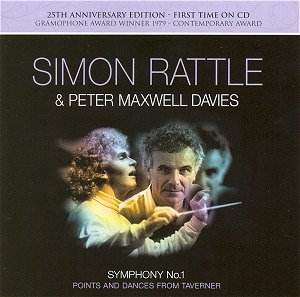Given
that most of Peter Maxwell Davies' previous recordings are now
unavailable (thanks to the demise of Collins and Unicorn Kanchana),
this current reissue is very welcome. I say this despite its unnecessary
promotion of conductor (Rattle) over composer in the artwork,
if not the booklet notes (mainly old ones by PMD himself). For
those newly initiated to the varied and superb music of this most
talented and grounded of contemporary British composers, there
is some hope on the recorded music scene. Regis have just reissued
the UK Sinfonia/Sinfonia Concertante disc with the
promise of new chamber discs on Naxos from the Magginis (a specially
commissioned series) and hopefully a reissue of the marvellous
Collins series.
This
listener's favourite PMD pieces were originally, and are, to some
extent still, his shorter and lighter orchestral works - the Collins
anthologies Maximum Max and Mavis in Las Vegas are,
despite some overlap of repertoire, totally essential if you are
lucky enough to encounter them - or if Naxos reissue them. The
latter is not entirely unlikely, given the example of the goldmine
of ex-Delos/Seattle/Schwarz discs of Diamond, Piston et al
that has recently hit the shelves. Anyone who has heard An
Orkney Wedding with Sunrise and doesn't have a place for it
in their heart probably doesn't have one! The symphonies, the
first of which is issued here for the first time on CD, are rather
sterner stuff. However they offer some marvellously distilled
fusions of concentrated nature painting (inspired by PMD's Orcadian
maritime/rural environment and previous northern muses, especially
Sibelius) and earlier influences (Taverner, Monteverdi etc.).
I still feel, perhaps rather sentimentally, that his greatest
(and possibly simplest) piece is the incredibly moving lament
for solo piano, Farewell to Stromness, written in the face
of impending nuclear industry despoliation of his adoptive home.
That said, the symphonies are a remarkable body of work and are
fully deserving of your attention.
The
four movement First Symphony, despite lasting almost an
hour, manages to avoid the charges of flabbiness and longueurs
that were levelled, from some quarters, at the composer's Violin
Concerto. A spare, taut feeling pervades, from opening Presto
(thirteen minutes plus), through the Lento initiated second
movement, and the gargantuan Adagio (nearly twenty minutes),
to the closing (again) Presto. In terms of music I have
recently encountered, the name Douglas Lilburn, especially the
later, spikier Third Symphony and some of the solo piano
music, springs especially to mind. The composer's own notes are
highly informative and mention key influences on the work - Orkney
poet George Mackay Brown, a PMD touchstone, is unsurprisingly
mentioned, as is Sibelius (more specifically, the Fifth Symphony).
Schumann and Boulez were rather less immediately obvious in their
relevance but that, in itself, may go some way to explaining the
broad appeal of the composer. The symphony was dedicated to William
Glock, a still controversial figure, yet PMD has recently been
described as "the new Vaughan Williams". So, if you would like
to hear some cogent, well structured (fairly) contemporary music,
look no further. The tunes are admittedly less abundant than in
the shorter pieces but for anyone well versed in say Rubbra or
Robert Simpson that need not represent too great a problem. Absolutely
worth hearing.
The
companion work is a series of "interludes" from the opera Taverner,
the subject of which is the 16th century composer who
looms very large in PMD's musical worldview. It features the legendary
Fires of London - Alan Hacker, Timothy Walker, Elgar Howarth etc.
- conducted by the composer in chamber style groupings. The music
is not as substantial as the symphony, unsurprising with sixteen
pieces lasting barely more minutes, yet is fascinating for its
updating of the musical styles of the time. It fascinatingly illustrates
the transition/overlap between the composer's avant-garde beginnings
and his mature style. An early triumph for the then young conductor
Rattle, this CD is an excellent addition to the Decca British
Composers imprint and carries a very strong recommendation.
Neil
Horner
